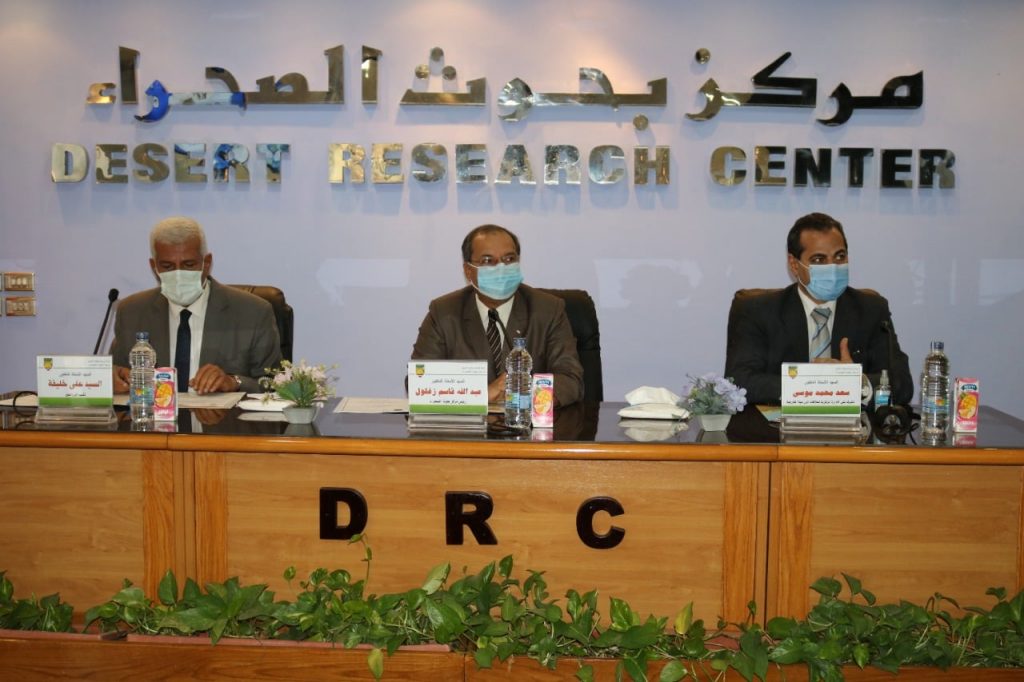Under patronage of Mr. El-Sayed Al-Qusair, Minister of Agriculture and Land Reclamation, the Desert Research Center celebrating the World Day to Combat Desertification in June 17, 2021, headed by Prof. Dr. Abdallah Zaglol, Head of the Desert Research Center convention to Combat Desertification (UNCCD). The celebration this year is under Slogan: “Restore.. Land.. Recovery (We build back better with healthy land)”, in presence of : Prof. Dr. El-Sayed Khalifa, Head of Agricultural Syndicate and director of ACSAD office in Cairo, Prof. Dr. Saad Moussa, General Supervisor of the Central Department of Foreign Relations, Prof. Dr. Safi El-Din Metwally – Vice President of the Desert Research Center for Research and Studies, Prof. Dr. Hossam Shawky- Vice President of the Desert Research Center for Projects and Research Stations and an elite of the Center’s professors. The celebration comes within the national obligations that sanctioned by the UN Convention to Combat Desertification (UNCCD).
Prof. Zaghlol , DRC President stated that we have to reclaim the degraded ecosystems, which can mitigate negative effects of the climatic changes, enhance the natural ingredients that increase resilience to natural disasters and severe weather conditions like droughts, floods, sand and dust storms.
He said that combating desertification also leads to limit the spread of epidemics and plant and animal diseases which are the human’s source of food.
He added that land reclamation will significantly contribute in recovering economy after the end of “Covid-19” pandemic, as it will create new job opportunities and achieve great economic results that benefit women and youth and ensure a better future for societies around the world.
Zaghlol said that the countries which will implement measures to combat desertification and reduce land degradation will increase reclaimed land areas as part of the Sustainable Development Strategy 2030.
This will preserve the planet and humanity from the dangers of famine, low income and the consequent draining of natural resources, loss of biodiversity and increased sensitivity to the risks of future potential environmental disasters.
This will contribute to building better relations between countries and balance ecosystems, communities and the government and private sectors, particularly in the production of food, feed and fibre.
Prof. Dr. Ahmed Abdel-Aty, the Committee on Science and Technology (CST) Coordinator of UNCCD said that this year’s celebration comes to shed light on the importance of combating desertification, adapting to drought, reclaiming lands and reforming various ecosystems worldwide, especially in areas highly sensitive to desertification and drought such as Egypt.
He stated that Combat Desertification would build a strong economy and raise the capability to face the various environmental challenges, which would help create new jobs, increase individual income and national output, and achieve food security and stability for societies around the world.
He added that saving ecosystems and rebuilding degraded ones became an urgent necessity today, as the dangers resulting from neglecting this trend leads to exposing humanity completely to disturbances and conflicts that may be threat on global security and peace by 2050.
The Director of ACSAD Office stated that desertification, land degradation and drought are threats lives of millions people around the world, especially women and children. Twenty-five years ago, 197 Part adopted a historic agreement aimed to take action to combat desertification on global level.
He said that degraded lands reducing national GDP in developing countries by 8% annually. So we must act urgently to change this. Protecting, restoring and making better use of land can contribute to reduce forced migration, improving food security and spurring economic growth, and can also help us to respond the global climate emergency. As we celebrate this International Day, let us acknowledge the imperative to combat desertification within our framework which aim to sustainable development.
He pointed to the necessity of cooperating with the Desert Research Center and scientific institutions for African countries, that suffer from desertification in order to provide them with their expertise in combating desertification and providing food security.
The General Supervisor of the Central Administration for Foreign Agricultural Relations indicated that the problem of desertification is one of the challenges facing not only Egypt, but some African countries, as there are more than 240 million people suffering from poverty and malnutrition. and the Egyptian state, under leadership of the President and the directives of the Minister of Agriculture, and cooperation between various Sectors gave their efforts to confront such challenges, such as: stopping encroachment on agricultural land, electing drought- tolerant varieties of plants, seeds production, transforming the agricultural land irrigation systems from old to modern irrigation methods, establishing water purification plants, and the national projects such as the project “one and a half million feddans” and the “new delta project” to combat desertification and achieve Egyptian food security so that the problem does not worsen and we become unable to solve it, pointing out that foreign agricultural relations support scientific research and work to facilitate research projects and the cooperating between sectors.


